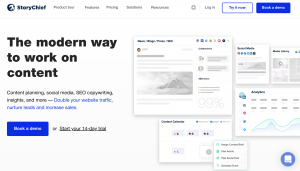
Table of Contents
Traditional marketing is losing effectiveness by the minute; as a forward-thinking marketer, you know there must be a better approach, and that is precisely what content marketing is all about!
Content Marketing is a strategic marketing technique that focuses on developing and delivering useful, relevant, and consistent content to attract and maintain a specific audience – and, eventually, to generate lucrative consumer action. “Valuable” is the crucial word here. It is what distinguishes this definition from others that might apply to nearly any type of advertising or marketing.
You can determine if a piece of material is suitable for a content marketing campaign if consumers seek it out and want to consume it rather than avoid it.
Here are some industry stats that support the cause of content marketing –
✓Content marketing generates 3 times as many leads as traditional outbound marketing. (DemandMetric)
✓70% of marketers say that content marketing has increased their brand awareness. (HubSpot)
✓91% of B2B marketers use content marketing to reach customers. (Content Marketing Institute)
✓Video is the most popular type, with 87% of marketers using video as a marketing tool. (Wyzowl)
✓ 72% of marketers say that creating engaging content is their top priority. (Social Media Examiner)
✓Companies with blogs generate 67% more leads per month than those without blogs. (DemandMetric)
✓Content marketing has a conversion rate 6 times higher than other methods. (Aberdeen)
✓61% of consumers are more likely to buy from a company that provides custom content. (DemandMetric)
✓57% of B2B marketers say that SEO generates more leads than any other marketing initiative. (Junto)
✓86% of B2C marketers believe that content marketing is a key strategy for their organization. (Content Marketing Institute)
So, in a nutshell, marketing using content is a sort of marketing that entails the development and distribution of online content (such as videos, blogs, and social media postings) that does not directly promote a brand but is designed to pique interest in its products or services.
But before we dive any deeper into this humongous topic of content marketing, let’s look at the different types or methods.
The Essential Tools of Content Marketing
Infographics
These are often lengthy, vertical drawings including statistics, charts, graphs, and other data. Infographics may be effective since a good one can be shared on social media and put on websites for years. That is also a type of content marketing, and the only expense is your time unless you pay a professional to do the work for you.
Content Writing
After infographics or graphic designing, the most visual part is content writing. What you are reading right now is a very good example of content writing. An average American reads about 100,000 words a day, which is why there are countless articles and blogs available online. Content writing is a service, and even though marketing firms also provide this service, companies still mostly prefer to go with a writing firm or professional content writing professionals for this job.
Podcasts & Video
Podcast marketing is the process of developing a plan and implementing strategies aimed at increasing your audience and recognition. We are frequently asked, “How can I increase my podcast?” And the first point we want to make is that progress takes time. Podcasting, especially podcast marketing, is a long-term investment.
Video marketing is the use of videos to promote and sell your product or service, boost interaction on your digital and social platforms, educate your consumers and customers, and reach out to a new audience. This also includes movies.
eBooks
People frequently think of eBooks as selling themselves, but effective marketers don’t sell eBooks merely to sell books; they promote them as marketing tools. Although self-publishing has made it simpler than ever to publish a book, there is still a widespread belief that it is difficult and that only respected experts can do it. Publish your own, and you can utilize it as content marketing every time you’re presented as the “Author of…”
Things You Could Learn From The Pros
Red Bull’s marketing strategy focuses on extreme sports and adventure, which aligns with its brand image. They have created a variety of content, including videos, images, and written articles, that showcase the excitement and energy associated with their brand. Red Bull’s content has been shared widely on social media and has helped to increase their brand awareness and engagement.
GoPro is another company that has used content marketing effectively to showcase its brand. They have created a community of users who share their experiences and adventures using GoPro cameras. GoPro has also created a variety of video content that showcases the capabilities of their cameras and the excitement of the activities they are used for. Their content has helped to increase their brand awareness and drive sales of their products.
Airbnb’s marketing strategy focuses on creating guides and stories that showcase unique travel experiences. Their content includes blog posts, videos, and social media posts that highlight different destinations and the experiences that travelers can have there. This approach has helped to position Airbnb as a company that provides unique travel experiences and has helped to increase its brand awareness and engagement.
HubSpot is a marketing software company that has used content marketing effectively to educate its audience and generate leads. They have created a variety of content, including blog posts, eBooks, and webinars, that provide valuable information and insights for marketers. HubSpot’s content has helped to position them as a thought leader in the marketing space and has helped to drive sales of its software.
These are just a few examples of companies that have used content marketing effectively to reach and engage their target audience.
Small Businesses and Start-ups Take Advantage of Content Marketing?
According to a HubSpot report if you are a small business that is active with blog posts, then you will have 55% more visitors to your website. Add SEO to that, and that number may increase even more!
And as marketing isn’t just about blog writing, so imagine how much your business will boost if you were to add all the other tools of content marketing into the mix!
Following are how content marketing helps a small business to grow:
- Helps you get noticed on search engines
- More visitors to your website
- Attracts more leads, eventually closing more sales
- Educate your viewers through informative articles
- Helps build awareness and beat your competition
- Better presence online, creating brand recognition and recall
The advantages of content marketing for small businesses are obvious–you may raise awareness of your company and its offerings, build meaningful connections with your audience, and even start generating more leads. All of these are critical measures in expanding your business.
But How to Market?
Okay, so now you understand what content marketing is, what are the different ways of it, and how it can help your business grow tremendously.
But how exactly can you market your brand?
Is your website enough?
Do you need a content marketing platform?
Technology Always Helps
First, let’s look at what a content marketing platform is.
It is a software system that allows marketing firms to consolidate and streamline their upstream marketing operations, from strategy and briefing to collaboration and approvals.
These platforms assist marketers in ensuring that the content targeted, provided, and optimized throughout the distribution stage of their process is meaningful, engaging, on-brand, and compliant.
Popular Content Marketing Platforms
HubSpot offers a content creation tool that allows you to easily create and manage your content, including blog posts, landing pages, and emails. The tool also offers features like SEO optimization, content recommendations, and social media sharing.

(hubspot.com)
SEMrush provides a content editor tool that allows businesses to create and optimize their content for SEO. The tool offers features like real-time SEO recommendations, readability analysis, and content performance analysis.

(semrush.com)
Story Chief offers a collaborative content editor that allows businesses to create and edit content with team members and external contributors. The tool also offers features like SEO optimization, content templates, and a content calendar.
Story Chief allows businesses to distribute their content across multiple channels, including social media, email, and content management systems (CMS). The tool also offers automated content distribution features, such as social media scheduling and email automation.
(storychief.io)
ContentCal
Now known as Adobe Express, ContentCal provides a calendar-based view of a business’s content schedule, allowing teams to plan and schedule content in advance. The tool also offers a content library where businesses can store and organize their content ideas.
ContentCal provides a range of tools for content creation, including a content editor, image editor, and hashtag suggestions.

(contentcal.com)
Seismic provides a centralized location for businesses to manage their sales and marketing content, including sales collateral, presentations, and marketing materials.
(seismic.com)
Upland’s Kapost is a content marketing platform that can help businesses plan, create, and distribute content more effectively. Kapost provides tools for content planning, including content calendars and workflows that allow businesses to map out their content creation process. Kapost offers a range of tools to help businesses create high-quality content, including content templates, collaboration tools, and content ideation tools. Kapost allows businesses to distribute their content across multiple channels, including social media, email, and blog platforms.

(uplandsoftware.com)
CoSchedule provides a visual calendar that allows businesses to plan and schedule their marketing campaigns, including social media posts, blog articles, and email marketing. CoSchedule offers a range of tools to help businesses create high-quality content, including a content editor, content planner, and content organizer.
(coschdule.com)
Ceros is an interactive content creation platform that allows businesses to create and publish engaging digital experiences without coding or design skills. Ceros allows businesses to create interactive digital content, including infographics, eBooks, quizzes, and more, using a drag-and-drop interface.
Ceros offers collaboration tools that allow teams to work together on content creation, including version control, commenting, and task assignments.

(ceros.com)
Out of the list above, you can go with any of these platforms as they provide similar services, with little adjustments and quality differences and of course, different costs. Yes, these services are not fully free, even though almost all of them have a free version of some sort. Most of these platforms are simple to use, ad clubbed with other freely available content creation software, so you can easily manage content yourself.
Summing Up – The Need for Content Marketing
There is no denying the fact that content marketing in the modern day is something that will never become irrelevant. Just like our body needs food, businesses need content. Period.
You can reach your target audience and enhance conversions by using efficient content marketing. There are various methods to use content marketing to increase income, increase brand awareness and recognition, and establish relationships with prospects and consumers.
To begin, evaluate which form of content works best for your company and audience, then create a content marketing strategy to start increasing your traction now.







